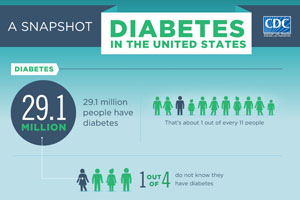
Obesity Medicine 2016 online registration now available
Your next opportunity to learn about obesity medicine from the leading clinicians in the field happens this spring in San Francisco! We're offering Practice Management Essentials (April 6), the Nutrition Course (April 7), and the Spring Obesity Summit (April 8-10). Register online now, or visit ObesityMedicineConference.org to learn more. |

CDC infographic shows a snapshot of diabetes in the U.S.
The U.S. Centers for Disease Control and Prevention (CDC) released an infographic that shows the impact of diabetes on the population of the U.S. The infographic shows staggering statistics about diabetes -- 29.1 million people have diabetes and 86 million people are at risk for diabetes -- and provides information about treating and preventing diabetes. This infographic may be a useful resource for discussing diabetes or prediabetes with your patients. |
 Help your patients plan ahead for the holidays with free handouts
The Look AHEAD Trial provides free handouts and resources about lifestyle intervention to health care providers. With the holidays quickly approaching, one relevant topic to discuss with your patients now is planning and preparing for the holidays, where the added stress of food, family, and entertaining can make it more challenging to stick to a treatment plan. Take advantage of the Look AHEAD handouts about holiday planning under the section titled, "Handouts - Planning ahead for life events," as well as other resources related to lifestyle intervention. |
 |
 Obesity Care Advocacy Network launched
Leading health care organizations announced last week the formation of the Obesity Care Advocacy Network (OCAN), a partnership that will advocate for public policies and increased education about obesity and change how the nation perceives and approaches the obesity epidemic. OMA is one of the founding organizations of OCAN, and we'll work with our partners to spread the word among other medical societies whose members may also be affected by the obesity epidemic. Read the full press release to learn more about OCAN. |
 OCC signs letter in support of a more detailed discrimination policy in the ACA
Section 1557 of the Affordable Care Act (ACA) "prohibits discrimination in the health care system on the basis of race, color, national origin, sex, age, or disability." Member groups of the Obesity Care Continuum recently signed on to a letter to Secretary Sylvia Burwell of the Department of Health and Human Services (HHS) urging that the language be revised to better define what discriminatory plan practices look like. The need for the letter resulted from many accounts of "discriminatory benefit design by some insurers" for patients with chronic diseases who take prescription medications. Read the full letter to Secretary Burwell to learn more. |
 |
 The Obesity Treatment Foundation helps keep you up to date on current obesity research. Each week, OTF publishes a brief overview of three recent studies so you can be in the know, even during your busiest days. Click the links below to view the full articles, and consider supporting OTF, so we can continue to provide you with updates. The Obesity Treatment Foundation helps keep you up to date on current obesity research. Each week, OTF publishes a brief overview of three recent studies so you can be in the know, even during your busiest days. Click the links below to view the full articles, and consider supporting OTF, so we can continue to provide you with updates. |
Resting metabolic rate varies by race and by sleep duration
Spaeth, A. M., et al. Obesity, 2015.
Sleep restriction is known to be a risk factor for weight gain. A study was conducted to assess the impact of sleep restriction and recovery sleep on energy expenditure in African-American and Caucasian men and women. Participants were randomly assigned to sleep four hours per night for five nights followed by one night with 12-hour recovery sleep or to the control condition, which allowed for 10 hours of sleep per night. The study found that resting metabolic rate, which is the largest component of energy expenditure, decreased after sleep restriction by 2.6 percent and returned to baseline levels after recovery sleep. No changes in resting metabolic rate were observed in control subjects. Compared to Caucasians, African-Americans had a lower resting metabolic rate and lower fat oxidation regardless of sleep duration. This study shows that sleep restriction decreases resting metabolic rate in healthy adults, which may partially explain the relationship between lack of sleep and weight gain. African-Americans may be at a disadvantage in terms of resting energy expenditure and fat oxidation compared Caucasians, regardless of sleep patterns. View article
|
RM-493, a melanocortin-4 receptor (MC4R) agonist, increases resting energy expenditure in individuals with obesity
Chen, K. Y., et al. J Clin Endocrinol Metab, 2015.
The melanocortin system integrates neural, metabolic, and hormonal signals and plays a key role in body weight regulation. Activation of the melanocortin subtype 4 receptors (MC4Rs) in the hypothalamus in animals reduces food intake, increases energy expenditure, and causes weight loss. In humans, the most well-known monogenic cause of obesity is haploinsufficiency of the MC4R, which indicates its role in energy balance. This study examined the effects of the MC4R agonist RM-493 on resting energy expenditure (REE) in patients with obesity. Twelve adults (six men and six women) with obesity received RM-493 (one mg every 24 hours) or placebo by continuous subcutaneous infusion over 72 hours. This was followed by crossover to the alternate treatment. All subjects received a weight-maintenance diet (50 percent carbohydrate, 30 percent fat, and 20 percent protein) and performed 30 minutes of standardized exercise daily. Energy expenditure (EE) was measured on the third treatment day in a room calorimeter. The study found that RM-493 increased REE versus placebo by 6.4 percent (111 kcal per 24 hours). Total EE trended to be higher and fat oxidation was higher with RM-493. These results suggest that activation of the MC4R in humans may be a way to increase energy expenditure and fat burning as a way to combat obesity. View article
|
|
|
*These events are hosted by organizations other than OMA. Contact the organization directly for details.
|
|
Answered by Dr. Denis Halmi
Q: Should bariatric surgery programs be required to integrate an obesity medicine physician or refer to one for long-term chronic obesity follow up?
A: An obesity medicine expert would be a great asset to any bariatric surgery program, and conversely, a bariatric surgeon would be a great asset to any medical weight-management program. I hope we are getting closer to the realization that both services are needed for complete care of the patient with obesity, and we are not competing.
|
|
Executive Director
Sponsorships and Exhibits Manager
Operations Manager
Education Coordinator
Communication Manager
Executive Director of the Obesity Treatment Foundation
|
|
101 University Blvd.,
Suite 330
Denver, CO 80206
|
|
 |
|
Playing Tetris decreases drug and other cravings in real-world settings
Skorka-Brown, J., et al. Addictive Behaviors, 2015.
Playing Tetris has been shown to reduce cravings in a laboratory setting. A study was conducted to examine if playing Tetris could lead to a reduction in real-world food, drug, or other cravings. Participants were prompted via text message seven times daily for a week to use their iPod to report craving target and strength (on a 0-100 scale), whether they indulged their previous craving, and whether they were under the influence of alcohol. Those assigned to the intervention then played Tetris for three minutes and reported their craving again. The study found that playing Tetris decreased craving strength for drugs (alcohol, nicotine, and caffeine), food and drink, and activities (sex, exercise, and gaming), with an average decrease of 13.9 percent, which was consistent all week. This study suggests that visual cognitive interference, such as playing Tetris, may be useful in reducing food and other cravings. View article
|
 |
Obesity Medicine 2016
This spring we're headed to San Francisco for Obesity Medicine 2016, your leading source of education about managing an obesity medicine clinic, nutrition, and the comprehensive approach to obesity treatment!
|
Full Conference30 CME | April 6-10 Includes Practice Management Essentials, the Nutrition Course, and the Spring Obesity Summit.
|
Practice Management Essentials6.5 CME | April 6
|
Nutrition Course6.5 CME | April 7
|
Spring Obesity Summit17 CME | April 8-10
|
Obesity Medicine Basics
This one-day course provides introductory-level training about the evaluation and treatment of patients affected by obesity. Refer a colleague to a course in their area and allow us to introduce them to obesity medicine. * Jan. 16 | Indianapolis * Jan. 23 | New Orleans * Jan. 30 | Philadelphia * Feb. 20 | Raleigh * Feb. 27 | San Diego * July 16 | Houston * July 30 | Minneapolis * Aug. 13 | Orlando
|
|
|
|
The Obesity Medicine Association and the Obesity Treatment Foundation thank our 2015 Corporate Advisory Council members for their continuous support.
|
© 2015 Obesity Medicine Association. All rights reserved. Materials may not be reproduced, redistributed or translated without written permission. Advertising disclaimer: Under a policy approved by the OMA executive committee and exhibitor/advertiser review committee, commercial companies may apply to advertise in OMA publications. Approval does not imply endorsement or official recognition of particular products or services.
|
|
|
|